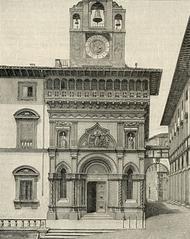Palazzo Camaiani Albergotti Arezzo: Visiting Hours, Tickets, and Travel Guide
Date: 14/06/2025
Introduction: A Portal to Arezzo’s Noble Past
Palazzo Camaiani Albergotti, also known as Albergotti Palace or “Palazzo delle Statue,” is a cornerstone of Arezzo’s historical and architectural heritage. Located at the crossroads of Corso Italia and Via degli Albergotti, this palazzo encapsulates the evolution of the city—ranging from medieval fortifications to Renaissance refinements, neoclassical grandeur, and early 20th-century decorative artistry. Originally formed by uniting homes of prominent Guelf noble families such as the Camaiani, Sassoli, and Albergotti, the palazzo stands as a testament to centuries of civic, social, and artistic transformation (Città di Arezzo Cultural Portal).
Today, the palazzo is admired not only for its imposing neoclassical façade and Arcangelo Ciofini’s allegorical terracotta statues but also for its richly frescoed interiors and vibrant early 20th-century Art Nouveau details, thanks to the work of Galileo Chini (Triphobo Guide). Although now home to the State Archive, Palazzo Camaiani Albergotti opens to the public during select cultural events and special tours, offering a rare window into the aristocratic and civic heart of Arezzo (Visit Arezzo).
This guide provides a detailed look at the palazzo’s history, architecture, artistic highlights, and practical visitor information, including hours, ticketing, accessibility, and travel tips—ensuring you make the most of your visit to this essential Arezzo landmark.
Table of Contents
- History and Origins
- Architectural Evolution and Artistic Heritage
- Visitor Information: Hours, Tickets, and Accessibility
- The Palazzo’s Civic and Cultural Role
- Planning Your Visit: Tips and Nearby Attractions
- Frequently Asked Questions
- References and Further Reading
History and Origins
Noble Lineages and Medieval Foundations
Palazzo Camaiani Albergotti traces its roots to the 13th and 14th centuries, originating from the consolidation of properties owned by the Guelf Camaiani, Sassoli, and Albergotti families. These noble houses wielded significant power in medieval Arezzo, leaving an indelible mark on the city’s political and urban structure. The original medieval tower—the Torre della Bigazza—formed the core of the early palace, showcasing the defensive and residential priorities of its era (Città di Arezzo Cultural Portal).
From Medieval Tower to Neoclassical Landmark
A Renaissance transformation in the 16th century introduced elegant courtyards, loggias, and decorative flourishes, signifying a shift toward refined noble living. The most significant changes occurred between 1792 and 1799, when Alessio Albergotti commissioned architect Leonardo Massimiliano de Vegni to create the current neoclassical masterpiece. The monumental façade, crowned by a triangular pediment with the Albergotti crest and terracotta statues by Arcangelo Ciofini, symbolized both family prestige and civic ideals (visitarezzo.com).
Architectural Evolution and Artistic Heritage
Exterior Features
The main façade along Corso Italia is defined by smooth ashlar masonry, six flat pilasters, and a Greco-Roman pediment. The seven allegorical statues atop the building—Fame, Virtue, and other classical figures—project the ideals of Enlightenment-era Arezzo and underscore the palazzo’s nickname, “Palazzo delle Statue.”
Interior Highlights
Inside, visitors find vaulted rooms adorned with 17th-century frescoes by Giovan Battista Biondi, late baroque and neoclassical decorations, and, in the early 20th century, vibrant Art Nouveau motifs by Galileo Chini. The piano nobile boasts landscapes such as “Paesaggio con costa marina” and “Paesaggio con templi greci,” reflecting the transition from baroque exuberance to neoclassical clarity (Triphobo Guide).
Gardens and Urban Context
A quadripartite, elevated rear garden—one of Arezzo’s finest—offers a tranquil retreat and a window onto the city’s layered history. The palazzo’s location near the ancient Roman road and Piazza Grande situates it at the heart of Arezzo’s civic life.
Visitor Information: Hours, Tickets, and Accessibility
Current Visiting Hours
As of June 2025, Palazzo Camaiani Albergotti is primarily a state archive and private residence, limiting daily public access. However, it opens its doors during special events such as the FAI Spring Days (“Giornate FAI di Primavera”), city festivals, and select guided tours.
- Regular Visits: Not available on a daily basis.
- Special Openings: Occur during spring and autumn cultural events; check schedules via the Arezzo Tourism Official Website or the FAI website.
Tickets
- Special Event Entry: €5–€10, with reduced rates for students, seniors, and children.
- Booking: Recommended in advance online or through local tourism offices during event periods.
Accessibility
- The ground floor and gardens offer partial wheelchair access; interior upper floors may present challenges due to stairs and uneven surfaces. Contact the venue ahead of your visit to arrange special assistance.
Location and Getting There
- Address: Via Camaiani, central Arezzo, a short walk from Piazza Grande.
- Accessible by foot from the main train station and city parking areas; taxis and local buses are also available.
Guided Tours
- Available during special openings, often in Italian, with English guides or materials by request. Tours generally last 30–60 minutes.
The Palazzo’s Civic and Cultural Role
Historical Importance
The palazzo has been a focal point for Arezzo’s civic events, social gatherings, and political life. The Albergotti family’s influence is embedded in the city’s history, from their Guelf allegiance to their patronage of the arts (visitarezzo.com).
Adaptive Reuse
Today, Palazzo Camaiani Albergotti serves as the State Archive, safeguarding vital historical documents. Its adaptive reuse ensures ongoing preservation and occasional public access, especially during cultural festivals and guided heritage tours.
Planning Your Visit: Tips and Nearby Attractions
- Advance Booking: Strongly recommended due to limited public access; check event listings well before your trip.
- Dress Code: Modest attire is appropriate, especially during formal or religious events.
- Photography: Policies vary by event; always ask before taking photographs inside.
- Best Time to Visit: Spring and autumn are ideal for comfortable weather and cultural events.
Nearby Attractions
- Piazza Grande: Arezzo’s iconic main square.
- Arezzo Cathedral: A masterpiece of Gothic and Renaissance art.
- Vasari House Museum: Home of the renowned Renaissance artist.
- Basilica di San Francesco: Famous for Piero della Francesca’s frescoes.
- Museum of Medieval and Modern Art: Features works by Vasari and other Tuscan masters.
Frequently Asked Questions
Q: When is Palazzo Camaiani Albergotti open to visitors?
A: The palazzo is open to the public only during special events, such as FAI Spring Days or city festivals. Always consult the official event schedule before planning your visit.
Q: How can I purchase tickets?
A: Tickets are typically available online via the FAI website or at the venue during event openings.
Q: Is the palazzo wheelchair accessible?
A: Partial access is available on the ground floor and gardens; contact organizers for specific accommodations.
Q: Are guided tours available in English?
A: Most are in Italian, but English-language guides or materials may be provided upon request.
Q: What are some nearby attractions?
A: Piazza Grande, Arezzo Cathedral, Basilica di San Francesco, and the Vasari House Museum are all within walking distance.
References and Further Reading
- Città di Arezzo Cultural Portal
- Triphobo Guide
- Visit Arezzo
- Visit Tuscany
- Palazzo Camaiani Albergotti Visitor Information
- FAI – Fondo Ambiente Italiano
Final Tips
Palazzo Camaiani Albergotti remains a vivid symbol of Arezzo’s noble legacy and artistic spirit. While public access is limited, timing your visit with cultural events, booking guided tours in advance, and exploring neighboring landmarks will make your experience truly memorable. Use digital resources like the Audiala app for audio guides and interactive maps, and consult official tourism sites for the latest updates.
Plan ahead, embrace the layered history, and discover one of Tuscany’s most evocative palaces in the heart of Arezzo.





